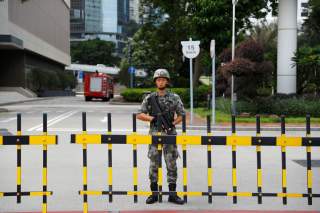A Reckoning over Hong Kong Is Coming and It Will Take China's Economy with It
The protests and Beijing's pressure could destroy Hong Kong's special place in the global and Chinese economies.
Then there is the secret cornerstone to Hong Kong’s success: the Hong Kong dollar’s peg to the U.S. dollar since 1973. This peg, actually a trading band between HK$7.75 and HK$7.85, has helped keep the city’s economy stable over the past few decades—especially during times of crisis. If the band is ever at risk of breaking, then the city’s de facto central bank (the Hong Kong Monetary Authority or HKMA) has a mandate to either buy or sell U.S. dollars as needed in order to protect the peg. Even today, despite the current state of relations between the United States and China, the peg is maintained.
The trade war may change that. The HKMA has already spent billions of dollars this year alone defending the peg. While the Authority still has sufficient financial reserves to defend the peg for a while, if a significant economic downturn occurs then the peg might break. If it does, then confidence in the Hong Kong dollar will plummet, and with it, the city’s reputation as a safe harbor from regional economic instability. Sensing this, the Trump administration has tied the Hong Kong protests to ongoing trade talks with Beijing. There is a chance that the administration could use the situation as leverage by threatening to remove recognition of Hong Kong’s special status. If that were to occur, then the peg would certainly would break, as the HKMA would no longer be able to acquire U.S. dollars.
In short, Hong Kong helps insulates mainland China from global economic turmoil. If its economy goes down, then the mainland will be exposed—including many prominent and influential Chinese companies that are based out of Hong Kong.
Future Uncertain
In the end, what will happen to Hong Kong?
At the moment, the prognosis is rather grim. The “one country two systems” model does genuinely appear to be dead, and with it, Hong Kong’s lofty position as a reliable international hub of business and finance. The economy will likely enter a prolonged recession, made worse if multinational businesses no longer have faith in the city’s ability to guarantee a neutral legal and political environment.
Socially, the city is divided like never before, with polling by the University of Hong Kong’s Public Opinion Programme and the Hong Kong Public Research Institute showing that respondents, particularly young people, increasingly see themselves distinctly as “Hong Kongers” rather than “Chinese.” Efforts at promoting a single Chinese identity seem to have failed.
Politically, the status quo is untenable. The size and persistence of the protest movement indicates that a significant portion of the population is not happy living under Beijing’s indirect rule. Yet calls for outright independence, though a small minority among protesters, have grown louder. Most protesters would prefer to preserve the “one country, two systems” model. Whether that is possible though is up for debate.
Hong Kong’s protesters could have been appeased earlier on, but after a number of crackdowns and missteps by the city’s government, that possibility seems faint. At the same time, it is highly unlikely that the protesters themselves can win outright—the city’s government will not concede to demands, especially for universal suffrage, without setting a troubling precedent. Hong Kong is at a stalemate, and all the while, the economy is deteriorating. If spirals out of control, then even the mainland’s delicate economic situation will be at risk.
This reality is why Beijing has not cracked down on Hong Kong’s protests yet: it knows that if the situation isn’t handled properly, then painful consequences would quickly follow. The current hope is that the protesters will burn out over time, allowing for a resumption of business as usual. Yet a restoration of the status quo may not be fully possible. Hong Kong’s position as a trustworthy location to conduct business has been harmed, perhaps irreparably. Regardless of what happens to the current protests, it is clear that the city’s population is at odds with its government and is increasingly seeing itself as a culturally distinct force.
Beijing might be able to pacify Hong Kong in the short term, but all signs point toward a future day of reckoning.
Carlos Roa is the senior editor of the National Interest.
Image: Reuters

